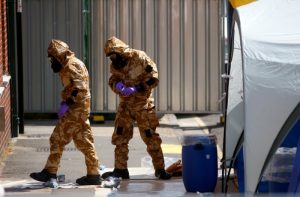
By Andrew Osborn
MOSCOW (Reuters) – Russia condemned a new round of U.S. sanctions as illegal on Thursday after news of the measures sent the rouble tumbling to two-year lows and sparked a wider asset sell-off over fears that Moscow was locked in a spiral of never-ending curbs by the West.
Moscow has been trying with mixed success to improve battered U.S.-Russia ties since Donald Trump won the White House in 2016, and Russia’s political elite was quick to chalk up a summit last month between Trump and Vladimir Putin as a victory.
But initial triumphalism swiftly turned sour as anger over what some U.S. lawmakers saw as an over deferential performance by Trump and his failure to confront Putin over Moscow’s alleged meddling in U.S. politics galvanized a new sanctions push.
Having bet heavily on improving ties with Washington via Trump, Moscow now finds that Trump is under mounting pressure from U.S. lawmakers to show he is tough on Russia ahead of mid-term elections.
In the latest broadside, the U.S. State Department said on Wednesday it would impose fresh sanctions by the month’s end after determining that Moscow had used a nerve agent against a former Russian double agent, Sergei Skripal, and his daughter, Yulia, in Britain, something Moscow denies.
In an early reaction, the Kremlin said the sanctions were illegal and unfriendly and that the U.S. move was at odds with the “constructive atmosphere” of Trump and Putin’s encounter in Helsinki.
The new sanctions come in two tranches. The first, which targets U.S. exports of sensitive national-security related goods, comes with deep exemptions and many of the items it covers have already been banned by previous restrictions.
However, the second tranche, activated after 90 days if Moscow fails to provide “reliable assurances” it will no longer use chemical weapons and allow on-site inspections by the United Nations or other international observer groups, is more serious.
NBC, citing U.S. officials, said the second tranche could include downgrading diplomatic relations, suspending the state airline Aeroflot’s ability to fly to the United States and cutting off nearly all exports and imports.
The State Department’s announcement fueled already worsening investor sentiment about the possible impact of more sanctions on Russian assets and the rouble at one point slid by over 1 percent against the dollar, hitting a two-year low, before recouping some of its losses.
The U.S. move also triggered a sell-off in Russian government bonds and the dollar-denominated RTS index fell to its lowest since April 11.
“There is local panic on the currency market,” BCS Brokerage said in a note. “At times, the number of those who want to ditch the rouble is becoming so high so there is not enough liquidity.”
ILLEGAL
The Kremlin said the new sanctions were “illegal and do not correspond to international law.”
“…Such decisions taken by the American side are absolutely unfriendly and can hardly be somehow associated with the constructive – not simple but constructive – atmosphere that there was at the last meeting of the two presidents,” Kremlin spokesman Dmitry Peskov said.
Washington had become an unpredictable player on the international stage, Peskov added, saying “anything could be expected” from it and that it was important that Russia’s financial system, which he described as stable, was prepared.
In a sign the Kremlin was not eager to escalate an already difficult situation however, Peskov said it was too early to talk about Russian countermeasures.
He criticized the U.S. decision to link the sanctions to the British nerve agent case, an incident the Kremlin has long cast as a Western plot to damage its reputation and provide a pretext for more sanctions.
Skripal, a former colonel in Russia’s GRU military intelligence service, and his 33-year-old daughter were found slumped unconscious on a bench in the southern English city of Salisbury in March after a liquid form of the Novichok type of nerve agent was applied to his home’s front door.
European countries and the United States expelled 100 Russian diplomats after the attack, in the strongest action by Trump against Russia since he came to office.
Konstantin Kosachyov, head of the upper house of parliament’s international affairs committee, was cited by the Interfax news agency as saying it looked like Washington was now behaving like “a police state.”
Dmitri Trenin, director of the Carnegie Moscow Center and a former colonel in the Russian army, said the State Department’s move looked like the latest salvo in what he called a hybrid war.
“Sanctions are the U.S. weapon of choice,” Trenin wrote on Twitter.
“They are not an instrument, but the policy itself. Russia will have to brace for more to come over the next several years, prepare for the worst and push back where it can.”
At variance with Moscow over Ukraine and Syria, Western sanctions have already drastically reduced Western involvement in Russian energy and commodities projects, including large-scale financing and exploration of hard-to-recover and deep water resources.
Proposed U.S. legislation prepared by several senators calls on Trump to widen the sanctions further to include virtually all Russian energy projects and effectively bar Western companies from any involvement in the country.
Introduced by Republican and Democratic senators last week in draft form, Senator Lindsey Graham, one of the measure’s lead sponsors, has called it “the sanctions bill from hell.”
(Additional reporting by Dmitry Zhdannikov, Tom Balmforth, Denis Pinchuk, Andrey Ostroukh; Editing by Richard Balmforth)










